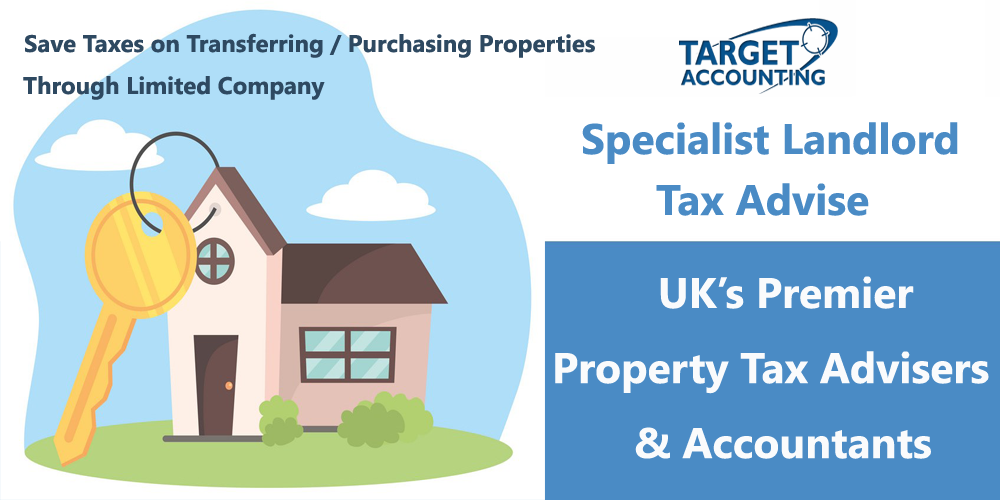Holding residential property in a limited company can definitely help lower the tax bill of some individuals, but the benefits mainly apply to higher rate taxpayers. Owning property in a company can also make it easier to pass on investments to children or grandchildren; however, buying property through a limited company can also work out to be disadvantageous mainly for basic-rate taxpayers. These ifs and buts are why it’s always advisable to seek expert advice before making decisions of this sort. An Accountant specialised in property taxation can guide you in best way.
Anyone thinking of transferring investment property they already own to a limited company should be cautious as this can work out as a costly exercise resulting in expensive legal and accountancy bills, a less good mortgage deal, and Capital Gains Tax (CGT) and Stamp Duty Land Tax (SDLT) on the transfer.
For basic rate taxpayers it’s probably more advantageous to keep investment property in personal ownership and to pay personal income tax on profits through self-assessment, taking advantage of all the allowable expenses and allowances that apply.
For higher rate taxpayers there are definite advantages to owning property in the company. Even though there are extra expenses involved with doing this, which is the stand out reason why this strategy is not recommended for basic rate taxpayers, anyone with rental income of 40k in total, who will certainly easily jump into the higher income bracket, should definitely consider a limited company portfolio. This approach can also protect personal assets, as the limited liability structure of a company can shield personal assets from business debts and liabilities.

In this scenario the company will pay corporation tax at 20% (tapering between now and 2020 to 18%), providing the income from the property is less than £300,000 p.a. In addition, tax relief on mortgage interest will still apply for property in the company, but stamp duty (SDLT) still applies for both personal and corporate investors. Another aspect of company ownership worth noting is that residential property worth more than £500,000 bought in the company is liable for a 15% SDLT charge unless the owner can demonstrate that the property will be let out commercially to third parties. Annual Tax on Enveloped Dwellings may also apply.
There are advantages and disadvantages of holding property in a limited company and this boils down to which tax band the investor belongs in and whether she or he is a higher rate taxpayer. Definitely, avoiding 45% tax if you’re a higher rate taxpayer must be a priority, but no one should just assume that buying property through a limited company structure is always the best way to go, and anyone looking to do so should seek advice from an accountant expert in small business accounting and tax planning.
FAQs on Holding Property in a Limited Company
How can I hold property in a limited company?
To hold property in a limited company, you can either purchase the property directly in the company’s name or transfer an existing property into the company’s ownership.
Additionally, you need to register the limited company with Companies House and comply with its filing requirements.
What are the advantages of holding property in a limited company?
Holding property in a limited company can provide tax advantages, limit personal liability, and offer more flexibility in terms of managing and transferring ownership. Similarly, operating a property business as a limited liability partnership (LLP) can provide limited liability and flexibility, making it an attractive option for property ventures.
Are there any specific legal requirements for holding property in a limited company?
Yes, there are legal requirements that must be followed, such as complying with company law, filing annual accounts, and adhering to property management regulations. One of these requirements is ensuring that the limited liability status of the company or LLP is maintained, protecting members from personal liability.
How does financing work when holding property in a limited company?
Financing for property held in a limited company can be obtained through commercial mortgages or loans specifically tailored for corporate entities.
Can I transfer personal property into a limited company without incurring stamp duty land tax?
Yes, you can transfer personal property into a limited company, but this process may have tax implications and legal considerations that should be carefully evaluated. Additionally, transferring personal property into a limited company may involve significant financial obligations, including potential tax liabilities and legal fees.
What are the corporation tax implications of holding property in a limited company?
Tax implications can vary based on factors such as rental income, capital gains, and the company’s overall financial structure. Individual landlords must pay income tax on profits from rental income and property sales. Similarly, partners in a limited liability partnership must pay income tax on their share of the profits. It is advisable to seek professional advice to understand the tax implications fully.
Can I use a limited company to hold multiple properties?
Yes, a limited company can hold multiple properties, providing opportunities to diversify investments and manage a portfolio of properties under one entity. A limited company or LLP acts as a separate legal entity, allowing for the management of multiple properties under one entity with distinct legal and financial responsibilities.
Are there any restrictions on the type of properties that can be held in a limited company?
While most types of properties can be held in a limited company, there may be restrictions on certain types of properties based on local regulations or company policies.
How can I dissolve a limited company that holds property?
Dissolving a limited company that holds property involves following the legal process for winding up the company, settling any outstanding debts or obligations, and transferring or selling the properties.
Where can I find more information on holding property in a limited company?
For more detailed information on holding property in a limited company, it is recommended to consult with legal advisors, accountants, or property specialists who have expertise in corporate property ownership. Additionally, consulting with legal advisors to draft a comprehensive LLP agreement that outlines the roles, responsibilities, and tax implications for members is crucial.


